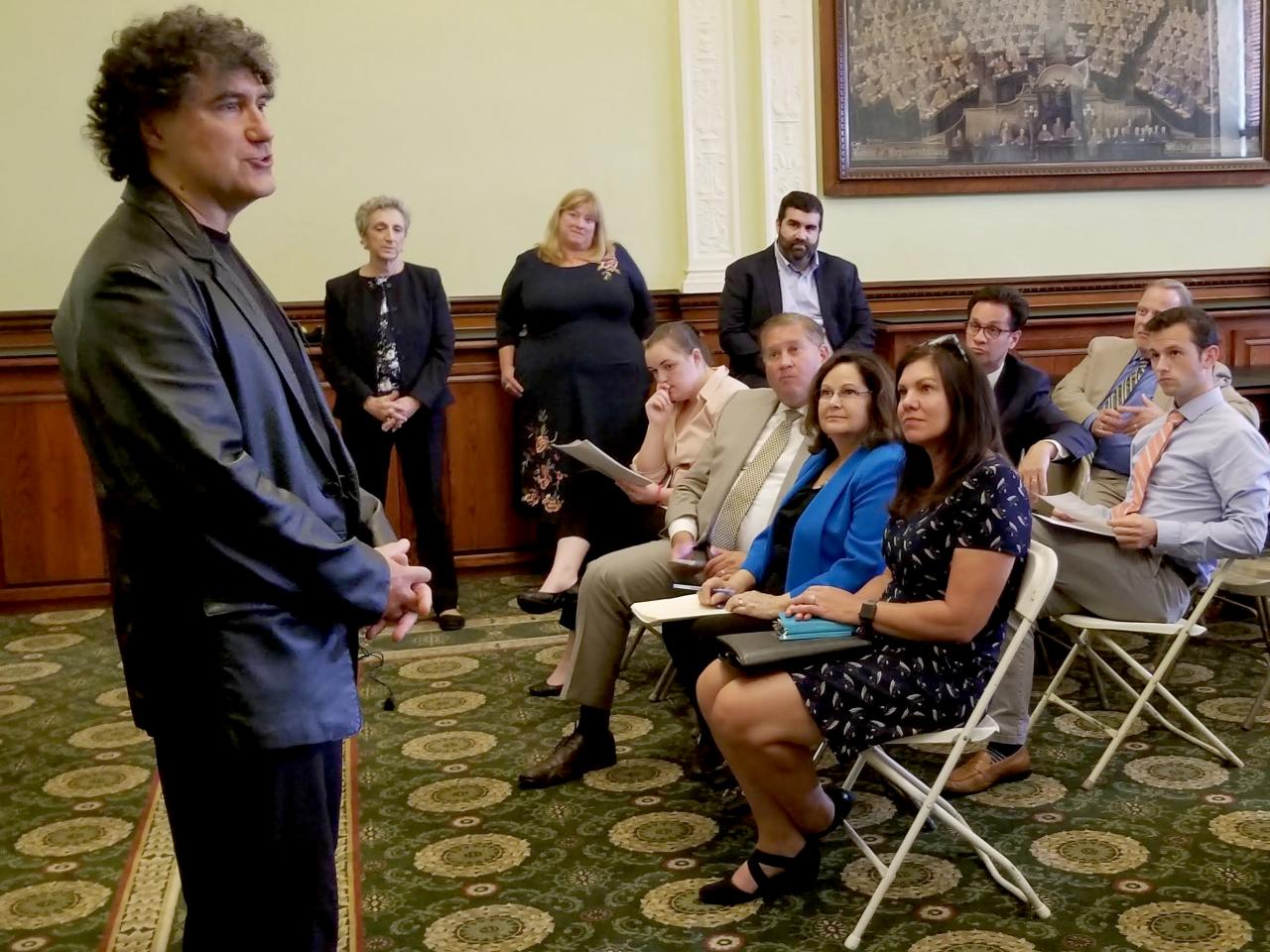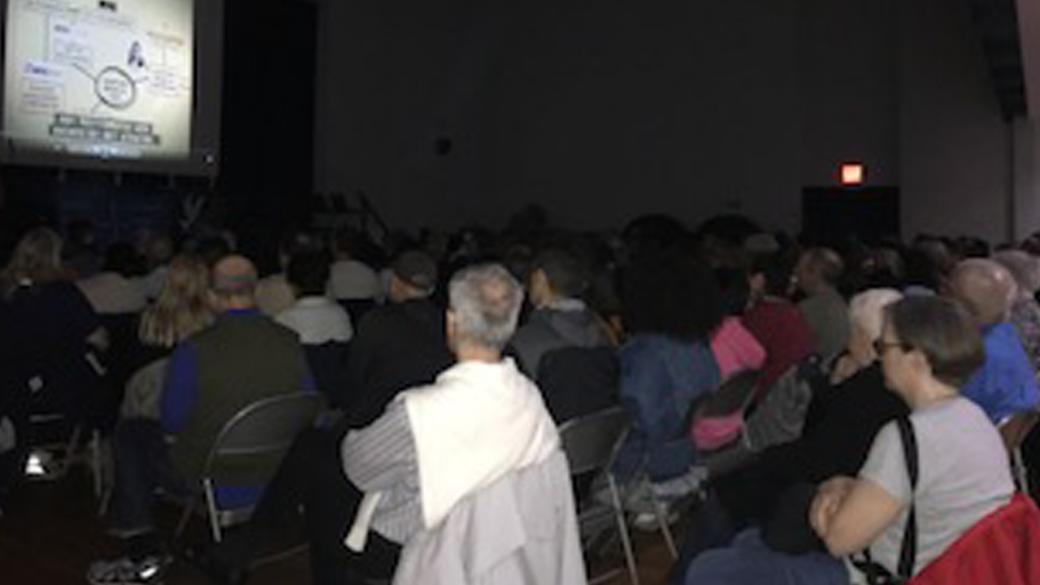10 Ways New Day Changed the World in 2019

Robbie Leppzer addressing an audience at the State House.
Schools, libraries, community organizations, and government agencies use New Day films every day to expand awareness on important, relevant issues. New Day films continue to be catalysts for change, and as 2019 comes to a close, we wanted to highlight a few of the ways our films have had an impact on the world.
1– A young man was encouraged not to seek violent revenge.
Julie Mallozzi’s restorative justice film, Circle Up, likely prevented at least one act of youth violence this year – possibly even a homicide. A New York City high school teacher asked Clarissa Turner – one of the film’s participants whose own son was murdered – to speak with a young man who was on the verge of committing an act of revenge violence. After watching the film and talking with Clarissa, the young man’s attitude had begun to shift; “I don’t know what I’m going to do but I know I’m not going to do THAT,” he disclosed.
2– A film concerning the Deaf community reaches out to others with disabilities.
Deaf Jam has had a long run in festivals, broadcasts, and community screenings; however, it was not until receiving an invitation to screen at the Superfest International Disability Film Festival that director Judy Lieff experienced something new and powerful with her film. Lieff created an audio description track to screen publicly to all audiences. Following the festival, messages began to roll in: "I saw Deaf Jam at the Superfest Film Festival this past weekend,” wrote Arora Kulvinder, Chair of Inclusion at the Poppy Jasper International Film Festival in California, “and I can tell you that everyone was awed at the brilliance of the film. This was the first time I was able to enjoy films together with my husband in a theater. He experiences low vision.”
3– An advocate for women and minorities is born.
Beauty in the Bricks – a film by Cynthia Salzman Mondell – captures the lives, hopes and dreams of four African American teenage girls in a West Dallas Housing Project. Watching the film at a homeless shelter when she was only 12 years old inspired Olinka Green to become an advocate for women and minorities in Dallas. Over 30 years later, Green had a showing of the film that brought together the West Dallas community and many of the people who were in the film; the film continues to promote pride in West Dallas residents.
4– City officials in New York City consider racial and socioeconomic impacts in large-scale real estate rezoning projects.
On May 4 Kelly Anderson and Allison Lirish Dean showed My Brooklyn as part of an educational and fundraising event sponsored by a local development organization that was suing the City of New York for passing a 59-block rezoning that did not conduct a proper environmental review. In an unprecedented decision in November, a judge sided with local leaders, saying that the city’s analysis was incomplete because officials did not study its racial and socioeconomic impacts. The film showing was an important educational piece to this decision, which is having ripple effects on rezoning proposals throughout the city.

5– A film providing innovative perspectives on people with traumatic brain injuries is reaching broader audiences.
Filmmaker Cheryl Green co-presented at the Oregon Association of Higher Education and Disability (ORAHEAD) state conference with three Disability Services Counselors and was also invited to screen her film, Who Am I To Stop It. As a consequence, her film is now an integral part of a three-hour seminar for the 2020 national Association of Higher Education and Disability (AHEAD) conference. The film gives a holistic view of students with traumatic brain injury disabilities and offers perspectives for supporting their educational and psychosocial needs.
6– A growing effort to impact mental health public policy, particularly in competitive sports, spreads as the National Basketball Association includes powerful excerpts from a New Day film on this topic on its website.

In July of 2019 Rick Goldsmith’s Mind/Game: The Unquiet Journey of Chamique Holdsclaw joined the National Basketball Association's “NBA Cares” mindhealth website, which addresses mental health issues in the sports world and beyond. NBA affiliates, as well as sports fans around the world, can now click on the Mind/Game link for excerpts of the film and to engage in online mental health dialogues.
7– A film about decommissioning a nuclear power plant in Vermont screened in the Massachusetts statehouse and helped legislators consider that issue in their own state.
Power Struggle screened before a bi-partisan audience of Massachusetts Democrat and Republican state senators and representatives at the Massachusetts statehouse in July. Representative Ruth Balser of Newton, Massachusetts, who had viewed the film previously, invited filmmaker Robbie Leppzer to screen Power Struggle as part of the legislature’s process of considering various proposed bills to regulate the decommissioning of a nuclear power plant in Plymouth, Massachusetts similar to the Vermont Yankee reactor depicted in Power Struggle. After viewing the film, Massachusetts State Senator Julian Cyr wrote, “Those of us in the Legislature owe a debt of gratitude to artists and activists like you who help us hold corporations – and ourselves – accountable.”
8– A film is now being screened on three continents, expanding worldwide a critical conversation for a more just and equitable solution to the situation in Palestine.
Hurdle by Michael Rowley has won four Jury Awards and has been covered by publications like the New York Times as it continues to resonate with viewers around the world. Following screenings, engaging and thoughtful Question and Answer Sessions have allowed audiences to engage in full and open discussion on difficult issues from this complex conflict.
9– Important issues of racism shown in Detroit provoke relevant discussions in small towns across the Mid-Atlantic.
In November 2019 Pam Sporn went on the road with her film Detroit 48202: Conversations Along a Postal Route.The tour, sponsored by the Mid-Atlantic Arts Foundation gave Sporn the opportunity to go outside of the urban bubble and show Detroit 48202 to audiences in smaller towns and communities that might not get to see a documentary about an African-American worker in a primarily African-American city. A white woman in Lancaster, Pennsylvania summed up the power of the film, "Any white person who sees this film cannot say they don't understand structural racism."
10– The death penalty is being reexamined as a consequence of a lobbying campaign which utilizes a New Day title on this controversial issue.
Oregonians for Alternatives to the Death Penalty (OADP) adopted Richard Stack and Maggie Burnette Stogner’s In the Executioner's Shadow as the centerpiece of its 2019 lobbying campaign, showing the film at town hall meetings across the state. The coordinator of OADP’s lobbying strategy credits In the Executioner’s Shadow with providing “the big lift” to help pass legislation to “reduce the use of the death penalty."